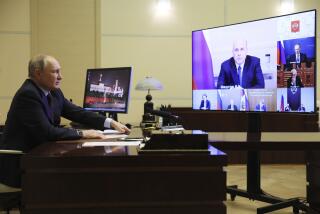Soviets to End A-Moratorium : Say 1st U.S. Test Next Year Will Trigger Theirs
- Share via
MOSCOW — The Kremlin announced today that it will scrap its moratorium on nuclear weapons testing after the first U.S. explosion in 1987, saying the Soviet Union “cannot show unilateral restraint indefinitely.”
The government statement was distributed by the official Tass press agency.
In Washington, White House spokesman Albert R. Brashear said: “Whether or not the Soviets resume their nuclear testing is their business. The U.S. position is clear and remains firm. Acceptance of the Soviet nuclear testing moratorium is not in the security interest of the U.S. or our friends and allies.”
“Nuclear weapons will remain for the foreseeable future a key element in our deterrent,” he said. “In such a situation, where we depend on nuclear weapons to deter aggression, nuclear testing is required to ensure the safety, security, reliability, survivability and effectiveness of those nuclear weapons--in short the credibility of our deterrent.”
Repeats Call for Talks
In its statement, the Kremlin repeated its call for immediate “full-scale talks on a total nuclear test ban” and said that, if the United States halts nuclear tests, the Soviet Union will not resume testing.
“The U.S.S.R. is prepared to continue to respect its moratorium. Yet it will resume nuclear testing after the first nuclear explosion carried out by the U.S. next year,” the statement said.
“At a time when the United States stubbornly continues to fulfill its nuclear test program to develop new nuclear weapons and build them up, the Soviet Union cannot show unilateral restraint indefinitely,” it said.
Diplomats have said Soviet leader Mikhail S. Gorbachev has come under increasing pressure from the military to end the moratorium. The military claims the Soviet Union is falling behind in the arms race without its own program.
The Soviets began their ban on nuclear testing Aug. 6, 1985, the 40th anniversary of the American atomic bombing of Hiroshima, Japan. It has been extended three times, with the latest extension scheduled to expire Jan. 1.
Repeated Soviet Appeals
Gorbachev and other officials have repeatedly called on Washington to make the test ban mutual as a first step toward nuclear weapons reductions.
U.S. officials have declined to join the test ban, arguing that some test explosions are necessary as long as nuclear weapons are deployed and because the blasts form part of the research into the Strategic Defense Initiative, President Reagan’s proposed space-based missile defense system commonly known as “Star Wars.”
Washington has also cited what it considers problems with verifying compliance with a ban on nuclear weapons tests.
Since the Soviet moratorium began, the United States has conducted 24 nuclear tests at the Nevada test site, of which 20 have been officially announced.
U.S. sources have reported another underground nuclear test is planned in Nevada on Jan. 29.
More to Read
Sign up for Essential California
The most important California stories and recommendations in your inbox every morning.
You may occasionally receive promotional content from the Los Angeles Times.













